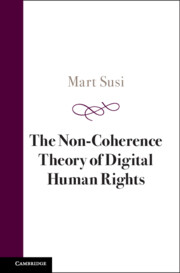Book contents
- The Non-coherence Theory of Digital Human Rights
- The Non-coherence Theory of Digital Human Rights
- Copyright page
- Contents
- Acknowledgements
- Introduction
- Part I The Contextual Challenges and Purpose of the Non-coherence Theory of Digital Human Rights
- 1 Horizontal and Vertical Governance Models and Normativity
- 2 The Ontological Dimension
- 3 The Epistemic Dimension
- 4 On the Controversy about the Relative Weight of Rights
- 5 Constitutional Entitlements to Human Rights in the Digital Domain
- Part II Reflections on Some Theories and Doctrines
- Part III The Core Elements of Non-coherence Theory
- Part IV The Impact of the Non-coherence Theory
- Part V Internet Balancing Formula
- In Lieu of the Concluding Remarks
- Index
5 - Constitutional Entitlements to Human Rights in the Digital Domain
from Part I - The Contextual Challenges and Purpose of the Non-coherence Theory of Digital Human Rights
Published online by Cambridge University Press: 22 February 2024
- The Non-coherence Theory of Digital Human Rights
- The Non-coherence Theory of Digital Human Rights
- Copyright page
- Contents
- Acknowledgements
- Introduction
- Part I The Contextual Challenges and Purpose of the Non-coherence Theory of Digital Human Rights
- 1 Horizontal and Vertical Governance Models and Normativity
- 2 The Ontological Dimension
- 3 The Epistemic Dimension
- 4 On the Controversy about the Relative Weight of Rights
- 5 Constitutional Entitlements to Human Rights in the Digital Domain
- Part II Reflections on Some Theories and Doctrines
- Part III The Core Elements of Non-coherence Theory
- Part IV The Impact of the Non-coherence Theory
- Part V Internet Balancing Formula
- In Lieu of the Concluding Remarks
- Index
Summary
The argument of non-coherence can be useful for explaining two principally different approaches about the interrelationship between constitutional principles originating from the offline reality and their applicability in the online domain. The first says that the constitutional ideas of the digital domain originate from the offline domain, and the second says that they do not, their origin being from inside the online domain in isolation from the offline. The process of the transposition of human rights law from one domain to another, including constitutional principles, has three stages. The first has to do with the reasons for such a transposition. The second stage is the emergence of ideas and subsequent discourse saying that something in human rights law and/or practice has to be changed in order to provide adequate protection online. The third stage of the transposition of offline fundamental rights to the online domain is the acceptance of new rights or principles, or conversely, the rejection of claims due to the absence of their necessity.
Keywords
- Type
- Chapter
- Information
- The Non-Coherence Theory of Digital Human Rights , pp. 57 - 70Publisher: Cambridge University PressPrint publication year: 2024



